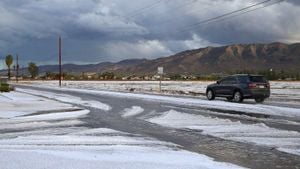Two Russian tankers, the Volgoneft-212 and Volgoneft-239, sank during severe storms on December 15, 2023, triggering serious environmental concerns and raising alarms about maritime safety protocols. The incident occurred near the Crimean Peninsula, within the contentious waters of the Kerch Strait, and has resulted in one confirmed death and significant oil spills.
According to Russian news agencies, both vessels were caught in intense storm conditions which led to the Volgoneft-212 splitting in half. The Environmental Ministry reported the Volgoneft-212 was carrying approximately 4,900 tons of heavy fuel oil, whereas the Volgoneft-239 had about 4,300 tons, totaling over 9,200 metric tons of oil products between them. The sinking of these vessels has raised fears of one of the largest environmental disasters to impact the Black Sea region.
The dramatic situation was exacerbated by video footage shared on social media showing the ship’s bow descending rapidly beneath the waves. This visual has stirred concern among environmental activists and local communities alike. "Any oil or petrochemical spill in these waters has the potential to be serious," said Dr. Paul Johnston, head of Greenpeace Research Laboratories, emphasizing the potential long-term effects of such spills on marine life and coastal ecosystems.
Rescue operations were hampered by continuing adverse weather conditions. While one crew member tragically lost his life, twelve others from the Volgoneft-212 were rescued, with emergency services reporting the successful evacuation of all fourteen crew members from the Volgoneft-239 the following day.
Greenpeace Ukraine warned of significant environmental damage stemming from the spills, recalling the catastrophic impact of past incidents. Johnston referenced the 2007 spill of 1,200 tons of oil, which resulted in severe ecological repercussions lasting more than a year. "If the oil faces the shoreline, cleanup will be extremely challenging," he noted.
The Russian government has responded by initiating two criminal investigations to examine potential safety violations exacerbated by the storm. President Vladimir Putin ordered the creation of a working group tasked with managing the rescue operations and addressing the ecological fallout resulting from the sinkings.
The Kerch Strait holds strategic importance, serving as the main corridor for Russian exports, especially grain and fuel. The area is under scrutiny, particularly because it has recently been highlighted for its environmental vulnerabilities. The stock of aging tankers operating under the potential classification of “shadow fleet” raises alarming questions about operational safety and insurance coverage. These outdated vessels often pose heightened risks for spills, as noted by recent studies warning of their environmental threats.
Media outlets have also reported on the quick response efforts; Russian Emergency Situations Ministry personnel are closely monitoring the situation and assessing the oil spill's extent. Environmental groups are poised to keep the situation under scrutiny to advocate for preventive measures against future incidents.
This sinking incident serves as a stark reminder of the precarious balance between economic activity and environmental safety, particularly amid the heightened tensions of Russia's war against Ukraine, which has already inflicted severe environmental damage across the region. Past experiences have shown the long-lasting impact of oil spills on local ecosystems, raising questions about the future integrity of such waters.
Further investigations will determine the full extent of the environmental damage, which experts fear could rival other significant spills from the past. The fate of the remaining oil on board these tankers raises concerns about potential leaks as salvage efforts continue. The incident serves as yet another stark warning about the risks involved with aging maritime infrastructure.
Greenpeace and other organizations have urged immediate preventive action to mitigate the risks posed by aging fleets and to impose stricter regulations on oil transport practices, emphasizing the need for improved safety protocols to avert similar catastrophes. The bright footage captured the hearts of many, highlighting not only the immediate human tragedy but also the upcoming ecological catastrophe.
With these developments, local communities and environmental groups are on high alert, advocating for comprehensive measures to safeguard against future maritime disasters. Only time will tell what the aftermath will entail, but the resonance of this incident may call forth significant policy changes concerning ship maintenance and environmental responsibility.



